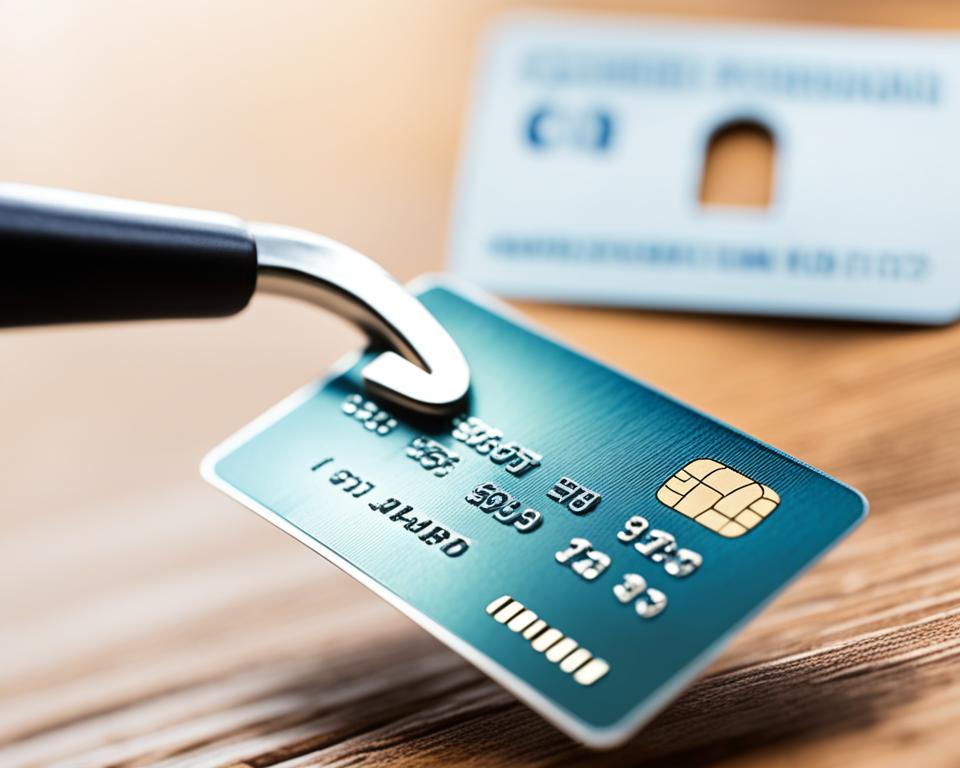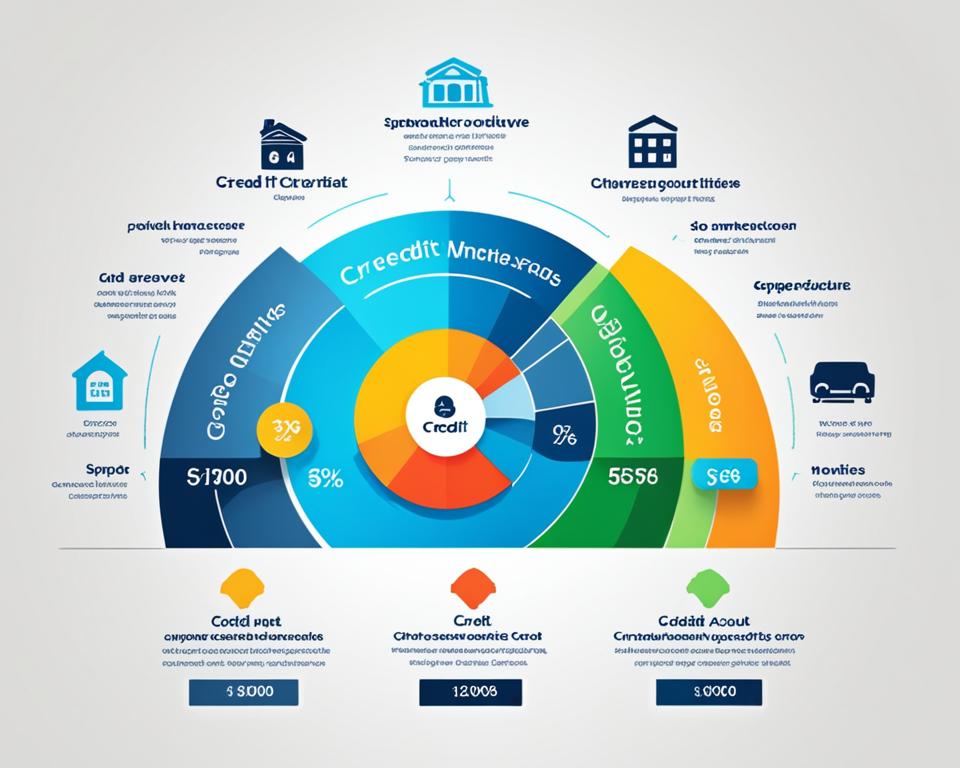Dealing with foreclosure or a short sale can have a significant impact on your credit scores. The good news is that it’s not the end of the road for your financial future. There are steps you can take to repair your credit and rebuild your financial standing.
Repairing credit after a foreclosure or short sale requires understanding the process and implementing effective strategies. By taking the right approach, you can bounce back and improve your credit scores over time.
Key Takeaways:
- Understand the impact of foreclosure or short sale on your credit scores.
- Monitor your credit reports regularly and dispute any inaccuracies.
- Pay off outstanding debts and focus on improving payment history.
- Consider a secured credit card to demonstrate responsible borrowing.
- Seek professional guidance if needed and create a budget for better financial management.
Understanding the Effects of Eviction on Credit Scores
While eviction itself may not have a direct impact on your credit scores, it can still have significant indirect consequences. Failure to pay rent that results in involvement from a collection agency can have a negative effect on your credit scores. Additionally, rental payment information may be included in your credit report, potentially leading to a detrimental impact on your credit score.
When an eviction occurs, it is important to be aware of how it can impact your financial well-being. Although not directly reported to credit bureaus, an eviction involving debt collection can lead to a derogatory mark on your credit report. This negative mark can stay on your report for up to seven years, causing potential difficulties in obtaining credit in the future.
It is essential to understand the potential consequences of eviction on your credit scores and take steps to mitigate the damage. By addressing any outstanding rental debt and ensuring that future rental payments are made on time, you can begin to repair your credit and improve your financial standing.
“Evictions that involve debt collection can lead to derogatory marks on credit reports, potentially causing difficulties in obtaining credit in the future.”
It is worth noting that not all rental payment information is reported to credit bureaus. However, some property management companies utilize third-party services that specialize in reporting rental payment information to credit bureaus. Therefore, it is crucial to inquire with your property manager or landlord about their reporting practices.
To gain a clearer understanding of the impact of eviction on your credit scores, regularly monitoring your credit reports and scores is essential. This will allow you to detect any inaccuracies or signs of debt collection activities that may adversely affect your creditworthiness.
Featured Table: The Impact of Eviction on Credit Scores
| Negative Impact | Positive Impact | |
|---|---|---|
| Direct Effect on Credit Scores | No direct impact | N/A |
| Indirect Effect on Credit Scores | Debt collection activities | N/A |
| Inclusion in Credit Reports | Potential derogatory mark | N/A |
How Foreclosure Impacts Credit Scores
Foreclosure can have a severe negative impact on your credit scores, unlike evictions which are not directly recorded on your credit reports. The repercussions of foreclosure can cause a significant decrease in your credit scores, with higher scores experiencing more damage. It’s important to understand how foreclosure affects your credit and take appropriate steps to minimize the impact.
When a foreclosure occurs, it is typically reported by the lender to the credit bureaus, and it becomes a part of your credit history. This negative information can stay on your credit reports for up to seven years, depending on your location. During this time, potential lenders and creditors can see this information, which can make it difficult to obtain new credit or secure favorable loan terms.
The impact of foreclosure on your credit scores varies depending on your individual circumstances and credit history. If you had a high credit score before the foreclosure, you can expect a more significant drop in your credit scores compared to someone with a lower credit score. This is because higher scores have more to lose.
Table: How Foreclosure Affects Credit Scores
| Credit Score Range | Estimated Score Drop |
|---|---|
| Excellent (700-850) | 100-160 points |
| Good (670-699) | 85-105 points |
| Fair (580-669) | 90-125 points |
| Poor (300-579) | 130-240 points |
It’s important to remember that even though foreclosure can wreak havoc on your credit scores, it doesn’t mean there’s no way to recover. With time, responsible credit management, and implementing strategies to rebuild your credit, you can gradually improve your scores and work towards a brighter financial future.
“A foreclosure can have a severe negative impact on credit scores, causing a significant decrease depending on the individual’s credit history and score.”
To learn more about the credit repair process after foreclosure, continue reading Section 4: Steps to Improve Credit Scores Post-Eviction or Foreclosure.
Steps to Improve Credit Scores Post-Eviction or Foreclosure
To begin repairing your credit after an eviction or foreclosure, it’s important to take proactive steps and implement effective strategies. By being proactive and consistent, you can gradually improve your credit scores and regain financial stability. Here are some essential steps to follow:
1. Monitor your credit reports and scores regularly
Regularly monitoring your credit reports and scores allows you to stay on top of your financial situation. Look for any inaccuracies, errors, or signs of identity theft that may be negatively impacting your credit. By identifying and addressing these issues promptly, you can prevent further damage to your credit scores.
2. Pay off outstanding debts
One way to improve your credit scores is to pay off any outstanding debts you may have. This includes any unpaid bills, credit card balances, or loans. By reducing your overall debt load, you can positively impact your credit utilization ratio, which is an important factor in determining your credit scores.
3. Focus on improving your payment history
Your payment history plays a significant role in determining your credit scores. Make a conscious effort to make on-time payments for all your credit accounts, including loans, credit cards, and utilities. Consistently paying your bills on time will demonstrate your creditworthiness and can lead to an improvement in your credit scores over time.
4. Lower your credit utilization ratio
Your credit utilization ratio refers to the amount of credit you’re using compared to your available credit. Aim to keep your credit utilization ratio below 30% to maintain good credit. Paying off credit card balances or requesting credit limit increases can help lower your credit utilization ratio and positively impact your credit scores.
| Steps to Improve Credit Scores Post-Eviction or Foreclosure |
|---|
| Monitor credit reports and scores regularly |
| Pay off outstanding debts |
| Focus on improving payment history |
| Lower credit utilization ratio |
By following these steps and making responsible financial choices, you can gradually improve your credit scores and work towards a brighter financial future. Remember, credit repair takes time and dedication, so be patient and persistent in your efforts.
Consider a Secured Credit Card
When it comes to rebuilding your credit, a secured credit card can be a valuable tool. By providing a security deposit, you can demonstrate responsible borrowing and start improving your credit scores over time. It’s important to use the card wisely and make timely payments to unlock its full benefits.

How does a secured credit card work?
A secured credit card requires a security deposit, typically equal to the credit limit of the card. This deposit serves as collateral and reduces the risk for the credit card issuer. It provides them with reassurance that they will be repaid if you fail to fulfill your credit obligations.
Secured cards are often recommended for individuals with poor or limited credit history, as they offer an opportunity to build or rebuild credit. By responsibly managing your secured credit card, you can demonstrate your creditworthiness and improve your chances of qualifying for other forms of credit in the future.
Why choose a secured credit card?
Here are a few benefits of using a secured credit card:
- Build credit: Secured credit cards report your payment history to credit bureaus, which can help establish a positive credit history.
- Increased credit scores: By making timely payments and keeping your credit utilization ratio low, you can improve your credit scores.
- Responsible borrowing: A secured credit card allows you to practice responsible borrowing habits by setting limits on your credit usage.
- Gradual improvement: Over time, responsible use of your secured credit card can open doors to unsecured credit cards and other financial opportunities.
How to use a secured credit card responsibly?
Here are some tips to make the most out of your secured credit card:
- Make timely payments: Pay your credit card bill on time to avoid any negative impact on your credit scores.
- Keep balances low: Aim to keep your credit utilization ratio below 30% by using only a portion of your available credit.
- Stay within your means: Avoid overspending and only charge what you can comfortably afford to repay.
- Monitor your credit: Regularly check your credit reports and scores to track your progress and ensure accuracy.
- Upgrade to an unsecured card: After demonstrating responsible credit habits, consider transitioning to an unsecured credit card with better terms and rewards.
Remember, using a secured credit card responsibly is key to rebuilding your credit. As you demonstrate responsible borrowing habits and your creditworthiness improves, you’ll be on the path to financial recovery.
A comparison of popular secured credit cards
| Secured Credit Card | Annual Fee | Minimum Security Deposit | Rewards Program |
|---|---|---|---|
| Discover it® Secured | $0 | $200 | Yes |
| Citi® Secured Mastercard® | $0 | $200 | No |
| Capital One® Secured Mastercard® | $0 | $49, $99, or $200 | No |
Bankruptcy as an Option
Bankruptcy can be a viable option for individuals facing the challenges of foreclosure and eviction. By filing for bankruptcy, you may be able to eliminate or reduce your debts, offering a potential fresh start. However, it is crucial to carefully consider the long-term impact on your credit scores and seek professional advice before making this decision.
While bankruptcy can provide relief from overwhelming debt, it has significant consequences, especially in terms of your credit scores. A bankruptcy filing will stay on your credit report for several years, and its presence can lower your credit scores substantially. This can make it more challenging to secure credit in the future and may impact your ability to qualify for favorable interest rates on loans and credit accounts.
Before moving forward with bankruptcy, it is essential to consult with a professional who can provide guidance tailored to your specific situation. They can help you understand the potential consequences, assist in evaluating alternative options, and guide you through the bankruptcy process if it is indeed the most suitable choice for your circumstances.
“Bankruptcy can provide a fresh start for individuals struggling with overwhelming debt. However, it’s crucial to weigh the long-term impact on credit scores and consult with a professional before pursuing this option.”
While bankruptcy can bring immediate relief, it is important to be aware that it is not a solution without its challenges. Effectively managing the bankruptcy process and rebuilding credit afterward requires careful planning and commitment. Developing a well-structured repayment plan and following it diligently can contribute significantly to your financial recovery.
It’s important to recognize that bankruptcy should not be regarded as an easy way out of financial difficulties. Instead, it should be viewed as a strategic decision that requires careful consideration and professional advice.
The Impact of Bankruptcy on Credit Scores
Bankruptcy can have a profound impact on credit scores for several years. The exact effect will depend on your specific circumstances, including the type of bankruptcy filed and the details of your financial situation. In general, bankruptcy will lower your credit scores and stay on your credit report for a considerable period.
For instance, a Chapter 7 bankruptcy, often referred to as a liquidation bankruptcy, remains on your credit report for ten years. On the other hand, a Chapter 13 bankruptcy, which involves a repayment plan, stays on your credit report for seven years.
It’s important to note that over time, the impact of bankruptcy on credit scores diminishes, especially if you take proactive steps to rebuild your credit and demonstrate responsible financial behavior. By implementing effective credit repair strategies and practices, you can gradually improve your credit scores and regain financial stability.
Rebuilding Credit Through New Credit Opportunities
While it may seem counterintuitive, obtaining new credit can actually help rebuild your credit scores. Applying for credit cards or auto loans, even if they come with higher interest rates, can show that you are capable of managing credit responsibly. By making regular payments on these new credit accounts, you can demonstrate your creditworthiness and make significant strides in improving your credit score.
If you have gone through a foreclosure or eviction, rebuilding your credit might feel like a daunting task. However, taking advantage of new credit opportunities can be a smart move on your journey to credit score improvement. By responsibly managing credit cards and auto loans, you can establish a positive payment history and demonstrate your ability to handle financial obligations.
Keep in mind that obtaining new credit comes with responsibilities. It’s important to make timely payments and avoid carrying high balances on your credit cards. By utilizing credit responsibly and keeping your debt-to-credit ratio low, you can reap the benefits of these new credit opportunities and steadily improve your credit scores.
Benefits of New Credit Opportunities:
- Showcases responsible credit management
- Improves creditworthiness
- Establishes positive payment history
- Displays the ability to handle financial obligations
Obtaining new credit can be a positive step forward in rebuilding your credit after experiencing a foreclosure or eviction. With patience, responsible borrowing, and consistent on-time payments, you can see improvements in your credit scores over time.

| Pros | Cons |
|---|---|
| Opportunity to establish a positive payment history | Potential for higher interest rates |
| Can demonstrate financial responsibility and creditworthiness | Possibility of accruing more debt |
| May improve credit scores over time | Requires responsible credit management |
Budgeting for Financial Stability
Creating and sticking to a budget is crucial for achieving financial stability. By carefully evaluating your income and expenses, you can make necessary adjustments to ensure you can meet your financial obligations and work towards a healthier financial future.
Start by listing all your sources of income, such as salary, investments, or rental income, and calculate the total amount. Next, make a comprehensive list of your monthly expenses, including fixed costs like rent or mortgage payments, utilities, insurance, and transportation, as well as variable expenses like groceries, entertainment, and dining out.
Once you have a clear picture of your income and expenses, consider areas where you can make adjustments. Look for opportunities to cut unnecessary expenses or find more affordable alternatives. For example, you could reduce your dining out budget by cooking at home more often or cancel unused subscriptions and memberships.
If needed, seeking professional help from a credit counselor can be an excellent step towards developing a debt management plan and negotiating with creditors.
A debt management plan (DMP) can help you consolidate your debts and create a structured repayment plan. A credit counselor will work with you to negotiate lower interest rates and affordable monthly payments with your creditors, making it easier to manage your debts and get back on track financially.
Remember, a well-implemented budget and debt management plan can provide peace of mind, reduce financial stress, and pave the way for a brighter financial future.
| Advantages of Budgeting | Benefits of a Debt Management Plan |
|---|---|
|
|
Implementing a budget and considering a debt management plan can have a significant impact on your financial well-being. It’s important to stay committed to your financial goals and maintain discipline in your spending habits. With time, persistence, and smart financial management, you can achieve long-term financial stability and build a solid foundation for your future.
Paying Credit Accounts and Reducing Debt
One of the most crucial steps in repairing your credit after a foreclosure or eviction is prioritizing the payment of credit accounts. By paying your credit accounts regularly and maintaining a positive payment history, you can gradually improve your credit scores and demonstrate responsible credit management to creditors. This will increase your chances of qualifying for future loans and credit opportunities.
Additionally, reducing your overall debt plays a significant role in improving your creditworthiness. Creditors assess your debt-to-income ratio to evaluate your financial stability. Lowering your debt helps you maintain a healthier debt-to-income ratio and shows that you are effectively managing your financial obligations.
Remember: Positive payment history and a low debt-to-income ratio are key factors that lenders consider when deciding whether to extend credit to you.
Strategies to Pay Credit Accounts and Reduce Debt
- Establish a budget: Creating a budget allows you to allocate funds specifically for paying your credit accounts and reducing debt. It helps you prioritize your financial obligations and avoid unnecessary expenses.
- Make minimum payments: Ensure you make at least the minimum payments on all your credit accounts. This helps maintain a positive payment history and prevents unnecessary late fees and penalties.
- Focus on high-interest debt: If you have multiple debts, prioritize paying off the ones with the highest interest rates first. This approach saves you money in the long run and helps you eliminate high-cost debt more quickly.
- Consider debt consolidation: If you have multiple debts with high interest rates, consolidating them into a single loan or credit card can simplify your payments and potentially lower your interest rates.
- Explore debt management programs: Debt management programs can help negotiate lower interest rates with creditors and develop a structured repayment plan tailored to your financial situation.
Keep in mind that paying credit accounts and reducing debt require discipline and consistency. It may take time to see significant improvements in your credit scores, but every positive step counts towards rebuilding your creditworthiness and achieving financial stability.
When implementing these strategies, it’s essential to monitor your progress regularly and make adjustments as needed. Remember that every individual’s financial situation is unique, and seeking professional advice from a credit counselor or financial planner can provide valuable guidance tailored to your specific needs.
| Benefits of Paying Credit Accounts and Reducing Debt | Actions to Take |
|---|---|
| Improves credit scores | Prioritize timely payments and maintain a positive payment history. |
| Enhances creditworthiness | Reduce your overall debt, particularly credit card balances, to achieve a healthier debt-to-income ratio. |
| Increases eligibility for future credit opportunities | Demonstrate responsible credit management by paying credit accounts and reducing debt. |
| Saves money on interest charges | Focusing on high-interest debt and exploring consolidation options can help lower interest expenses. |
| Provides financial stability | Establish a budget and follow through with debt management strategies to achieve stability. |
Remember, the path to credit repair and debt reduction requires patience and perseverance. By making consistent efforts and adopting responsible financial habits, you can gradually improve your credit scores and regain control of your financial future.

Seek Professional Credit Counseling
If you’re struggling to manage your debt and create a budget, consider seeking professional credit counseling. A reputable credit counselor can provide you with expert guidance and help you develop a customized plan to tackle your debts and regain control of your finances.
Managing debt can be overwhelming, especially if you’re facing high interest rates, multiple creditors, or collection efforts. Credit counseling services can offer valuable assistance by:
- Evaluating your financial situation and identifying the best strategies to manage your debt
- Creating a budget that aligns with your income and expenses
- Negotiating with your creditors to lower interest rates or establish more manageable repayment plans
- Providing education and resources to help you understand credit and improve your financial literacy
By working with a credit counselor, you can gain insights into debt settlement options and explore alternatives to bankruptcy. They can help you explore debt consolidation, debt management plans, or other methods to reduce your debt burden and achieve financial stability.
Choosing a Reputable Credit Counseling Agency
When selecting a credit counseling agency, it’s essential to do thorough research to ensure they are reputable and trustworthy. Consider the following factors:
- Accreditations and certifications: Look for agencies that are accredited by recognized organizations, such as the National Foundation for Credit Counseling (NFCC) or the Financial Counseling Association of America (FCAA). These accreditations ensure that the agency follows industry best practices.
- Experience and expertise: Check the agency’s track record and the qualifications of their credit counselors. Verify their credentials and reputation in the industry.
- Transparency and fees: Credit counseling agencies should be transparent about their fees and services. Avoid agencies that charge exorbitant fees or make unrealistic promises.
- Availability of resources: A credible agency will provide educational materials, resources, and tools to help you understand and manage your debt effectively.
Remember, seeking professional credit counseling is a proactive step towards taking control of your debt. By working with an experienced credit counselor, you can develop effective strategies to manage your debt and pave the way towards financial freedom.
| Benefits of Credit Counseling | Drawbacks of Credit Counseling |
|---|---|
|
|
“Credit counseling provided me with the tools and expertise I needed to get back on track financially. The credit counselor helped me create a realistic budget and negotiated lower interest rates on my credit cards. Thanks to credit counseling, I am better equipped to manage my debt and work towards a debt-free future.”
Establishing Good Credit Habits
To rebuild your credit after a foreclosure or short sale, it’s crucial to establish good credit habits. By consistently demonstrating responsible financial behavior, you can gradually improve your credit scores and regain financial stability.
One of the key elements of good credit habits is making on-time payments. Paying your bills promptly shows lenders that you are reliable and can be trusted to manage credit responsibly. Late payments can have a negative impact on your credit scores, so it’s essential to prioritize timely payments.
“Paying your bills promptly shows lenders that you are reliable and can be trusted to manage credit responsibly.”
In addition to making on-time payments, it’s important to keep your credit card balances low. High credit card balances can negatively impact your credit utilization ratio, which is the percentage of your available credit that you’re using. Aim to keep your balances below 30% of your credit limit to demonstrate responsible borrowing and maintain a healthy credit score.
“Keeping your credit card balances low can help you maintain a healthy credit score.”
Managing your debt responsibly is another crucial aspect of establishing good credit habits. It’s essential to avoid taking on excessive debt and to make a conscious effort to pay off existing debts. By effectively managing your debt, you demonstrate your ability to handle financial responsibilities and improve your creditworthiness.
Benefits of Establishing Good Credit Habits
Establishing good credit habits brings various benefits and can significantly impact your financial well-being. By demonstrating responsible borrowing and debt management, you increase your chances of:
- Qualifying for better interest rates on loans
- Being approved for credit cards and other financial products
- Gaining access to higher credit limits
- Building a positive credit history for future financial endeavors
“Establishing good credit habits can open doors to better financial opportunities and improve your overall financial health.”
With diligent practice, you can develop these good credit habits and lay the foundation for a strong credit profile. Over time, the positive impact of your responsible financial behavior will be reflected in improved credit scores and financial well-being.

Steps for Establishing Good Credit Habits
| Step | Description |
|---|---|
| Make On-Time Payments | Pay your bills on time to demonstrate reliability and responsible borrowing. |
| Keep Credit Card Balances Low | Maintain low balances to improve your credit utilization ratio and show responsible credit management. |
| Manage Debt Responsibly | Avoid excessive debt and make efforts to pay off existing debts to demonstrate sound financial management. |
Time as a Factor in Credit Repair
When it comes to credit repair, time is a crucial element in the process. Negative information, such as a foreclosure or eviction, may have a significant impact on your credit scores initially, but as it gets older, its influence begins to wane.
It’s important to understand that credit repair is not an overnight process. It takes time for your credit scores to recover from past derogatory marks. However, with proactive steps and a focus on building positive credit habits, you can gradually improve your credit scores over time.
A key strategy for credit repair is to establish a positive payment history. This means paying your bills on time consistently and avoiding late payments. Positive payment history demonstrates to lenders and credit bureaus that you are responsible and trustworthy with credit.
Additionally, adding recent positive activity to your credit report can help boost your credit scores. This could involve obtaining new credit accounts, such as a secured credit card, and using them responsibly. By making timely payments and keeping your credit utilization low, you can showcase your creditworthiness and improve your scores.
It’s essential to be patient and persistent during the credit repair journey. Rome wasn’t built in a day, and neither is your credit. Remember that positive changes take time to reflect in your credit scores. By maintaining good credit habits and focusing on the long-term goal, you can gradually rebuild your credit and achieve financial stability.
Staying committed to your credit repair efforts is crucial. Don’t get discouraged if you don’t see immediate results. Consistency is key, and by sticking to your plan and practicing responsible financial behavior, you can make significant progress in repairing your credit.
Now, let’s take a look at a table that illustrates the impact of time on credit repair:
| Time Frame | Credit Score Improvement |
|---|---|
| 1-6 months | Minimal improvement as positive payment history builds |
| 6-12 months | Noticeable improvement as recent positive activity outweighs older negative information |
| 1-2 years | Significant improvement as older negative marks become less influential |
| 2+ years | Continued improvement as positive credit history strengthens |
Remember, the table above is just a general guideline and individual results may vary. The key takeaway is that the longer you focus on building positive credit habits and staying committed to the process, the better your credit scores are likely to become over time. Keep in mind that there are no shortcuts to credit repair, and it requires patience, perseverance, and responsible financial behavior.
Patience and Persistence in Credit Repair
Rebuilding credit after foreclosure or eviction can be a challenging process, but with patience and persistence, it is possible to improve your credit scores and regain financial stability.
When faced with the task of credit repair, it’s important to stay committed to your efforts and understand that it may take time to see significant improvements. The damage caused by foreclosure or eviction doesn’t disappear overnight, but with consistent effort, you can make positive changes to your credit history.
Why Patience is Key
Patience is crucial in the credit repair journey because the impact of negative events on your credit scores gradually diminishes over time. As these negative events age, their influence on your credit diminishes, and positive financial habits take precedence. By maintaining good credit habits and consistently demonstrating responsible borrowing behavior, you’ll be on the path to credit score improvement.
Remember that building positive credit takes time. It’s important to avoid quick-fix solutions or scams that promise instant credit repair. These often result in more harm than good and could potentially worsen your credit situation. Instead, focus on long-term strategies that cultivate healthy financial habits.
The Power of Persistence
Persistence is another essential quality in the credit repair process. It’s not uncommon to encounter setbacks along the way, such as inaccuracies on your credit report or uncooperative creditors. However, persistence allows you to navigate these obstacles and continue working towards improving your credit scores.
Be proactive in addressing any issues you identify on your credit report. Dispute inaccuracies, resolve unpaid debts, and establish a consistent payment history. Even small steps, when taken consistently, can have a significant impact on your credit repair journey.
“Patience and persistence are vital when it comes to credit repair. Building positive credit history takes time, but with dedication and consistency, you can achieve your financial goals.” – [Real Name]
The Rewards of Credit Repair
While credit repair may require patience and persistence, the rewards are well worth the effort. As your credit scores improve, you’ll have access to better interest rates, increased loan options, and greater financial freedom.
Keep in mind that the journey towards credit repair is not solitary. It’s crucial to seek guidance from reputable credit repair services or financial advisors who can provide expert advice specific to your situation. With their assistance, you can develop a personalized credit repair plan and navigate the complexities of the credit system more effectively.
Key Steps for Patience and Persistence in Credit Repair
| Steps | Description |
|---|---|
| 1. Monitor Your Credit Regularly | Check your credit reports and scores frequently to track your progress and identify any errors or discrepancies. |
| 2. Establish Good Credit Habits | Make on-time payments, keep credit card balances low, and manage your debts responsibly to demonstrate creditworthiness. |
| 3. Address Inaccuracies | Dispute any inaccuracies or inconsistencies on your credit reports to ensure the information is up to date and accurate. |
| 4. Stay Committed | Adopt a long-term mindset and remain dedicated to your credit repair efforts, even when obstacles arise. |
| 5. Seek Professional Guidance | Consult reputable credit repair services or financial advisors for expert advice tailored to your specific needs. |
By approaching credit repair with patience and persistence, you’ll be taking significant steps towards improving your credit scores and achieving financial stability. Stay committed, stay focused, and you’ll reap the rewards of your efforts.
Regularly Monitor Your Credit
When it comes to the credit repair process, regular monitoring of your credit is absolutely crucial. By keeping a close eye on your credit scores and consistently reviewing your credit reports, you can stay on top of any errors or discrepancies and take immediate action to address them. Monitoring your credit is the first line of defense in protecting your financial well-being and ensuring that your credit repair efforts are on track.
With credit monitoring, you can stay informed about changes to your credit profile and detect any fraudulent activity early on. This allows you to take proactive steps to mitigate the impact and protect yourself from potential identity theft. By regularly checking your credit reports, you can verify the accuracy of the information being reported and make sure it aligns with your financial history.
One effective strategy is to set up alerts or notifications through credit monitoring services. These alerts can notify you of any significant changes to your credit scores or new entries on your credit reports, empowering you to identify and address issues promptly. In addition, credit monitoring can provide insights into the factors influencing your credit scores, helping you make informed decisions to improve your financial health.
Importance of Regular Credit Monitoring
“Regular credit monitoring allows you to stay proactive and take immediate action in case of any inaccuracies or suspicious activity on your credit reports.”
By engaging in regular credit monitoring, you can:
- Identify and correct errors or inaccuracies on your credit reports
- Detect and address potential signs of identity theft or fraudulent activity
- Stay informed about changes to your credit scores and credit profile
- Monitor the effectiveness of your credit repair efforts
To have a clear understanding of the benefits of credit monitoring, let’s take a closer look at how it helps in various aspects of credit repair:
| Aspect of Credit Repair | Benefits of Credit Monitoring |
|---|---|
| Identifying Errors | Regular monitoring allows you to catch any errors or inaccuracies on your credit reports, such as incorrect personal information, outdated accounts, or fraudulent entries. By addressing these issues promptly, you can prevent potential negative impacts on your credit scores. |
| Addressing Identity Theft | Through credit monitoring, you can detect any suspicious activity that may indicate identity theft. By being notified of new accounts, credit inquiries, or changes to your personal information, you can take immediate action to stop fraudulent activities and protect your credit. |
| Tracking Credit Score Progress | Credit monitoring services provide regular updates on your credit scores, allowing you to track your progress over time. By analyzing the factors influencing your scores and monitoring improvements, you can make informed decisions to further enhance your creditworthiness. |
Remember, credit monitoring should be an ongoing practice throughout your credit repair journey. By staying vigilant and proactive, you can ensure that your credit remains accurate, protect yourself from potential threats, and maximize your chances of achieving a healthier credit profile.
Conclusion
Repairing your credit after a foreclosure or short sale is not an easy process, but it is definitely achievable with the right strategies and commitment. Understanding the impact of eviction and foreclosure on your credit scores is the first step towards financial recovery. By making positive financial choices, seeking professional guidance when necessary, and demonstrating patience and persistence, you can rebuild your credit and work towards a brighter financial future.
It’s important to remember that credit repair takes time. There are no overnight solutions, and quick fixes should be approached with caution. Instead, focus on implementing effective strategies such as monitoring your credit reports regularly, paying off outstanding debts, and maintaining a positive payment history. Patience is key as negative information on your credit reports ages and its impact diminishes.
Seeking professional guidance through credit counseling can also provide valuable insights and assistance in creating a personalized debt management plan. Establishing good credit habits and responsibly managing new credit opportunities can further contribute to your credit repair journey. Remember, every positive step you take brings you closer to achieving financial recovery and rebuilding your credit.
So, stay committed, stay persistent, and stay focused on your goal. With dedication and the right strategies in place, you can improve your credit scores and regain financial stability. Embark on this journey of credit repair with confidence, knowing that your efforts will not go unnoticed. Your hard work will pay off, and you will be on your way towards a brighter, more secure financial future.
FAQ
How can I repair my credit after a foreclosure or short sale?
To repair your credit after a foreclosure or short sale, you can start by monitoring your credit reports and scores regularly, paying off outstanding debts, and improving your payment history. Consider obtaining a secured credit card, creating a budget, and seeking professional credit counseling if needed.
Will an eviction affect my credit scores?
While an eviction itself won’t directly impact your credit scores, it can indirectly affect them if you fail to pay rent and a collection agency is involved. Rental payment information may also be included in your credit report, potentially harming your credit score.
How does foreclosure impact my credit scores?
Foreclosure is recorded on your credit reports and can have a severe negative impact on your credit scores. It can cause a significant decrease in your scores, with higher scores experiencing more damage. Foreclosures can stay on your credit reports for up to seven years.
What steps can I take to improve my credit scores after eviction or foreclosure?
To improve your credit scores after eviction or foreclosure, it’s important to monitor your credit reports regularly, pay off any outstanding debts, and focus on improving your payment history. You can also consider obtaining a secured credit card and creating a budget to manage your finances effectively.
How can a secured credit card help rebuild my credit?
A secured credit card can be a helpful tool in rebuilding your credit. By providing a security deposit, you can demonstrate responsible borrowing and improve your credit scores over time. It’s important to use the card responsibly and make timely payments to reap the benefits.
Is bankruptcy an option for foreclosure or eviction situations?
Bankruptcy may be an option for those struggling with foreclosure or eviction. Filing for bankruptcy can eliminate or reduce your debts, potentially providing a fresh start. However, it’s important to consider the long-term impact on your credit scores and consult with a professional before making this decision.
Can obtaining new credit help rebuild my credit scores?
Yes, obtaining new credit can help rebuild your credit scores. Applying for credit cards or auto loans, even if they come with higher interest rates, can show that you can manage credit responsibly. Making regular payments on these new credit accounts will demonstrate your creditworthiness.
How can budgeting contribute to financial stability?
Creating and sticking to a budget is crucial for achieving financial stability. Evaluate your income and expenses, make necessary adjustments, and ensure you can meet your financial obligations. If needed, seek professional help from a credit counselor to develop a debt management plan and negotiate with creditors.
What should I prioritize when paying my credit accounts?
Prioritize paying your credit accounts regularly and maintaining a positive payment history. This will help improve your credit scores and show creditors that you are responsible with credit. Additionally, focus on reducing your overall debt, particularly credit card balances, which can positively impact your creditworthiness.
Should I consider professional credit counseling?
If you’re struggling to manage your debt and create a budget, it’s worth considering professional credit counseling. A reputable credit counselor can help you create a plan to tackle your debts, negotiate lower interest rates, and provide guidance on managing your finances effectively.
How can I establish good credit habits?
To establish good credit habits, make on-time payments, keep credit card balances low, and manage your debt responsibly. By consistently demonstrating responsible financial behavior, you can gradually improve your credit scores.
Does time play a role in credit repair?
Yes, time plays a significant role in credit repair. As negative information, such as a foreclosure or eviction, gets older, its impact on your credit scores lessens. Focus on building a positive payment history and adding more recent positive activity to your credit report to improve your credit scores over time.
What are the keys to successful credit repair?
Rebuilding credit after foreclosure or eviction takes time, patience, and persistence. Stay committed to your credit repair efforts and be consistent in maintaining good credit habits. With dedication, you can improve your credit scores and work towards a brighter financial future.
How important is credit monitoring throughout the credit repair process?
Regularly monitoring your credit is crucial throughout the credit repair process. Keep track of your credit scores and review your credit reports for any errors or discrepancies. Stay vigilant in protecting your credit and take action to address any issues that may arise.
Can I repair my credit after foreclosure or short sale?
Yes, repairing credit after foreclosure or short sale is possible with the right strategies and commitment. By understanding the impact of eviction and foreclosure, making positive financial choices, and seeking professional guidance if needed, you can rebuild your credit and achieve financial recovery. Patience and persistence are key, as credit repair takes time. With dedication, you can improve your credit scores and work towards a brighter financial future.





